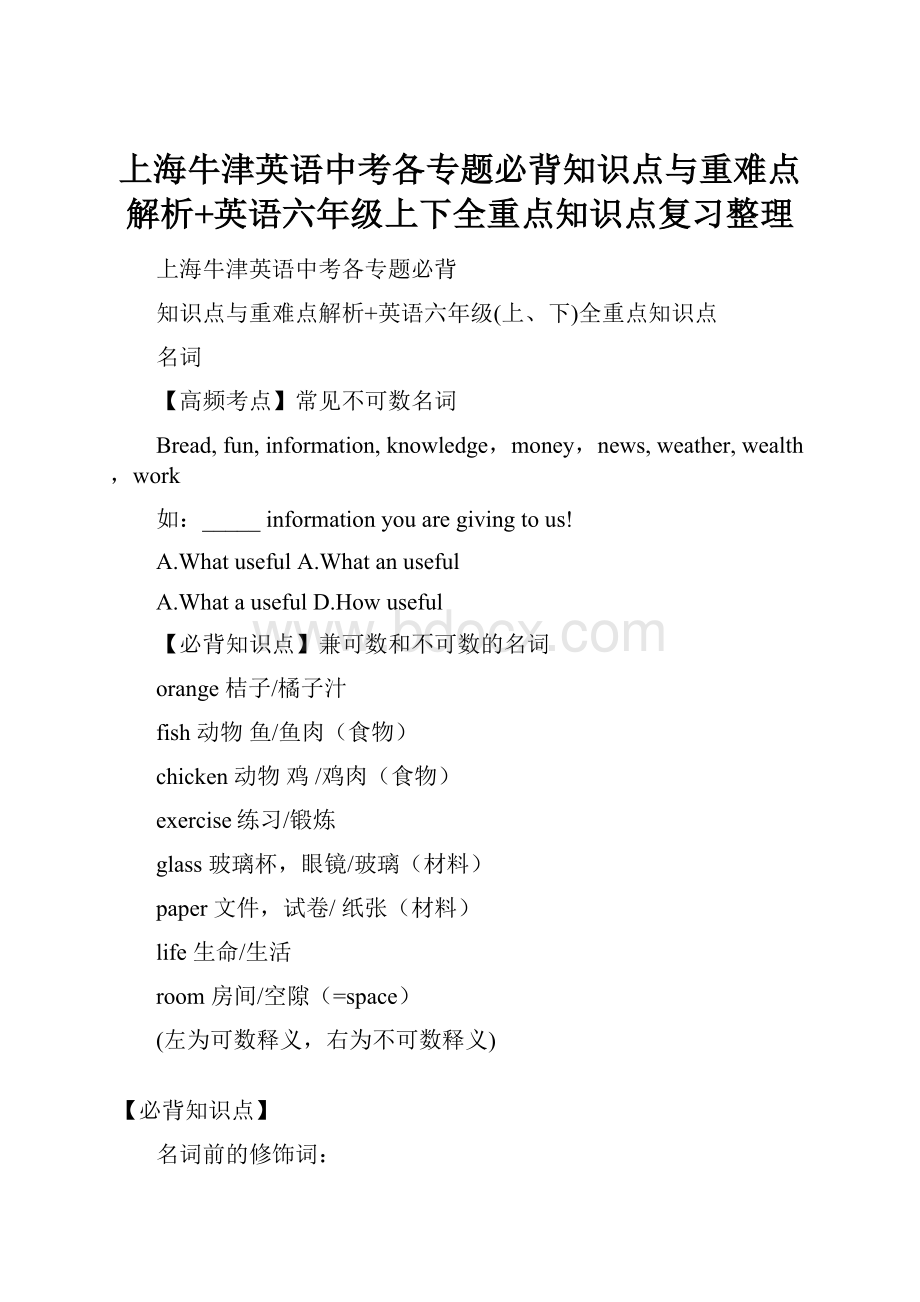上海牛津英语中考各专题必背知识点与重难点解析+英语六年级上下全重点知识点复习整理.docx
《上海牛津英语中考各专题必背知识点与重难点解析+英语六年级上下全重点知识点复习整理.docx》由会员分享,可在线阅读,更多相关《上海牛津英语中考各专题必背知识点与重难点解析+英语六年级上下全重点知识点复习整理.docx(18页珍藏版)》请在冰豆网上搜索。

上海牛津英语中考各专题必背知识点与重难点解析+英语六年级上下全重点知识点复习整理
上海牛津英语中考各专题必背
知识点与重难点解析+英语六年级(上、下)全重点知识点
名词
【高频考点】常见不可数名词
Bread,fun,information,knowledge,money,news,weather,wealth,work
如:
_____informationyouaregivingtous!
A.WhatusefulA.Whatanuseful
A.WhatausefulD.Howuseful
【必背知识点】兼可数和不可数的名词
orange桔子/橘子汁
fish动物鱼/鱼肉(食物)
chicken动物鸡/鸡肉(食物)
exercise练习/锻炼
glass玻璃杯,眼镜/玻璃(材料)
paper文件,试卷/纸张(材料)
life生命/生活
room房间/空隙(=space)
(左为可数释义,右为不可数释义)
【必背知识点】
名词前的修饰词:
①放在可数名词复数前的有:
many(许多),few(很少),afew(一些), a(small/large)numberof(许多),several(几个),acoupleof(几个)
②放在不可数名词复数前的有:
much(许多),little(很少), alittle(一些),agreatdealof,asmall/largeamountof;
③(可数、不可数前)都可放的词有:
alotof,lotsof(许多),some(一些)any,plentyof
区分:
alot相当于very表示“很,非常”,后面不能加名词;alotof表示“很多”,后面加名词。
Anumberof表示“一些”,thenumberof表示“…的数量”,前者谓语用复数,后者谓语用单数。
名词所有格
's表示“某人家”、“店铺”,省略后面的名词
eg:
atMr.Green’s,tomyuncle’s,atthedoctor’s,atthetailor’s
冠词
【常考易错点】(必须记牢)
Auseful/university/European/one-eyed/+名词;
auniform/unit/usedcar
anhourunusual(否定前缀)
an+honest/8-year-old+名词
【难点】
冠词a/an在序数词前,表“又一”=another
Hedidn’tgiveupandtookaseventhtry.
【必背知识点】
the在序数词和形容词最高级前。
如:
Thethirdoneiscarryingthefewestofall.
在姓氏复数形式之前,表示“某某一家”或“某某夫妇”。
如:
theGreens,theBlacks,etc.
官职、头衔的名词前,第几大街和公园前不加冠词。
如:
XiJinpinghasrecentlybeenelected__/__presidentofourcountry.
有些名词前用冠词或不用冠词,其意义有所不同。
如:
1)attable在吃饭;atthetable在桌子旁
2)inclass在上课;intheclass在班级中
3)inhospital在住院inthehospital在医院里
4)gotobed上床睡觉;gotothebed到床上去
代词
【难点】Other、another、theother、others、theothers辨析
1、+the为有范围如:
Thereare30peopleintheroom,19ofthemaremen,theothersarewomen.
2、+s后面不可加名词如:
theotherstudents=theothers
3、Theother后可加名词也可不加。
表示两者之一的另一个,不加名词。
表示“剩余的”后加名词。
如:
Oneofthetwinsisreading,theotheriswatchingTV.
19ofthestudentsintheclassroomarestudying,theotherstudentsareplaying.
4.释义区别Another"又一,另一"other/others"其他的"theothers"其他的,剩余的"theother"另一个;其他的,剩余的"
不定代词either、neither、both、all、none
注意范围区分:
两个以内:
either、neither、both
三个及三个以上:
all、none
【易错点】either,neither作主语时谓语用单数,其余为复数。
数词
【必背知识点】
Hundred,thousand,million,billion单独使用没有复数形式。
如:
twohundreds×
复数形式和of连用可表示数以百/千/百万/亿计.
如:
hundredsof√但twohundredsof×
Over,more/lessthan等词后须接准确的数字,如:
Over___peoplewereagainsttotheuseofnuclearweapon(核武器).
A.5billionB.Billionsof
C.5billionsD.5billionsof
【易错点】
基数词(如one)放到名词的后边,该名词一般要大写;序数词(如tenth)放到名词的前面,加定冠词,不大写。
常出现在填空题。
如The_____Lessonisverydifficultbutisveryimportant.(twelve).[key]Twelfth
注意:
加连字符里单词都要用单数,且用连字符的词组后面一定要加名词,后面没有名词时不可用连字符。
如:
Sheis12-years-old.×
Sheisa12-year-oldgirl.√
Sheis12yearsold.√
[经典例题]Todayistheoldman’sone____________birthday.(hundred)
Herantheraceinthreeminutesandsixty-eight___________.(two)
[keys]hundredth;seconds
非谓语动词
1.Enjoy/like/love/befondofdoingsth.喜欢做某事
eg:
Sheisfondofdoingchemicalexperiments.她喜欢做化学实验。
2.Keep/keepon/carryon/goondoingsth.继续做某事
eg:
Wekeepongoingonandoncausethisiswherewebothbelong.让我们一直拥有,并走下去,因为这是我们俩共同拥有的。
3.Feellikedoingsth.想要做某事
eg:
Ifeellikegivinguponthejob.我觉得我不能从工作中摆脱出来。
4.Practicedoingsth.练习做某事
eg:
Theypracticedoingsoquicklyandaccurately.他们学习快而准确的做。
5.Giveupdoingsth.放弃做某事
eg:
Ifmybossasksmetodosuchkindofthinganymore,I'llgiveupworking.如果我老板再要我做这样的事,我就辞职不干了。
6.Begoodat/dowellindoingsth.擅长做某事
eg:
Forexample,theDutchdowellindisposingofwastes.欧洲就非常善于使用再生资源,例如:
荷兰的垃圾。
7.Payattentiontodoingsth.注意做某事
eg:
Weshouldpayattentiontoourbehaviorinpublic.在公共场所应注意自己的言谈举止。
8.Whatabout/howaboutdoingsth.……怎么样(好吗)?
eg:
Whatabouteditingofthefilm?
这部电影的编辑怎么样呢?
9.Thankyoufordoingsth.为……感谢某人
eg:
Thankyouforflyingwithus.谢谢您乘坐我们的飞机。
10.Minddoingsth.介意做某事
eg:
Wouldyouminddoingmeafavour?
你介意帮我个忙吗?
11.Beusedfordoingsth./beusedtodosth.被用来做某事
eg:
Computersareusedtodomanyjobsintheoffice.电脑在办公室被用来做很多事。
12.Spend…(in)doingsth.花时间做某事
eg:
Howmuchtimeyouspenddoingdailyexercise?
你每天花多少时间做运动?
13.Bebusydoing/withsth.忙于做某事
eg:
Heisbusywithsomeimportantwork.他忙着处理一些重要的工作。
14.Finishdoingsth.做完某事
eg:
You'dbetterfinishdoingyourhomeworktonight.你最好今晚完成家庭作业。
15.Makeacontributiontodoingsth.在……做贡献
eg:
Wewilltryourbesttomakeacontributiontolightingindustry.竭力为照明事业做出贡献!
16.Preferdoingsth.todoingsth.喜欢……胜过……
eg:
Heprefersdoingtotalking.他宁愿做,不愿说。
17.Be/getusedtodoingsth.习惯做某事
eg:
Lifeisnotfair,getusedtoit.生活是不公平的,但我们要适应它。
18.Keep/stop/preventsb.fromdoingsth.阻止某人做某事
eg:
Unlesswegetmorefunding,we'llbepreventedfromfinishingourexperimentalprogramme.除非我们得到更多的拨款,否则就会妨碍完成这项试验计划。
加dosth的单词有:
感官动词see,hear,feel,watch,notice;使役动词make,let.
后接形容词的动词有
系动词bebecomegetgoturnkeep
使役动词makelet
感官动词looksoundsmelltastefeel
{
如:
Thefishgoesbad.鱼肉坏了。
Thenewsmakeshimsad.这则消息让他难过。
Shelookslovelyinpink.她穿粉色衣服显得可爱。
上海牛津英语六年级上下册全知识点梳理
频度副词
always/sometimes/usually/never 是频度副词 ,提问应该要用How often„?
在句中的位置是:
放在行为动词的前面,放在be动词的后面。
也可以说“行前系后”。
E.gShe is always kind.她总是很善良的。
She always helps other people.她总是帮助其他人。
不能出现这样的句子:
She is always helps other people.(×)
一句话中不能同时出现两个动词。
并且要注意主谓保持一致,尤其注意第三人称单数不可以忽略。
howoften与howmanytimes
howoften提问“频率次数+时间范围”
howmanytimes提问“频率次数”
e.g.—Howoftendoyouexercise?
—Twiceaweek.
—Howmanytimeshaveyoubeenthere?
—Twice.
副词
表示动作特征或性状特征。
一般用来形容或修饰除了名词和代词以外的词,主要修饰形容词、动词、其他副词和句子。
Helooksveryhappy.(修饰形容词)
Theoldladyiswalkingslowlynow.(修饰动词)
Luckily,hegotthefirstprize.(修饰句子)
形容词后面+ly构成副词:
slow—slowlyslight—slightlyquick—quicklycareful—carefullyfierce—fiercely
immediate—immediatelygentle—gentlylucky—luckilyhappy—happily
介词
What else do you do with your„?
你和你的„还干什么?
With是个介词,后面接人称代词时,要用宾格的形式。
With me/him/her/it/us /them 在具体的某一楼层只能用介词on,并且第几层还要用序数词 On the ground floor, on the first floor, on the fifteenth floor
具体的某一天介词只能用on
On Sunday, On Sunday morning,On the Open Day
he one on the left/right 左边/右边的这个 the one in the middle 中间的这个
如果是介词短语修饰the one,应该要放在the one后面 ,如果是形容词应放the one的中间the left/right one the middle one
at weekends= at the weekend在周末
现在完成时
现在完成时的构成是:
have/has +动词的过去分词。
have/hasbeento去过,到过(表示现在已经回来)
have/hasbeenin住在=havelived/stayedin
have/hasgoneto去,到…..(表示现在还没有回来)
e.g.WehavealreadybeentoChangfengPark.
IhavelivedinShanghaiforthirteenyears.
Have you been to …..yet?
你去过„..吗?
Yes, I have already/just been to…./been there.是的,我已经去过了。
No, I haven‟t been to …/been there yet.不,还没有去过。
already已经(多用于肯定句,放于动词前)
yet迄今,还(多用于疑问句和否定句,放于句末)
just刚刚(用法和位置和already相同)
e.g.IhavealreadybeentoLily’shome.
HaveyoubeentoLily’shomeyet?
No,Ihaven’tbeentoherhomeyet.
live/stay…for…在…住/待…(时间)
for+一段时间,多与现在完成时连用表示动作从过去延续到现在的一段时间,并用howlong提问。
代词
one用来指代一个人或事物,而ones用来指代一些人或事物。
定冠词the
定冠词the的用法:
a.在球类运动前不加定冠词theplayfootball/basketball/tennis,etc.
b.在乐器前必须加定冠词theplaythepiano/violin,etc.
c.在watchingtelevision中,不加定冠词the
时间表达方式
on the tenth of September / on September tenth 9月10日
two fifteen= a quarter past two 2:
15
Three ten = ten past three 3:
10
One thirty = half past one 1:
30
two forty = twenty to three 2:
40
half an hour=30minutes 用了half an hour后面就不能再有minutes
one and a half hours=one hour and a half一个半小时
One hour and twenty minutes一小时二十分钟
a.m./p.m.分别表示上午和下午。
First,…/Next,…/Then…/After that,…/Finally,…
Finally=at last =in the end
时间状语从句
…when…当...的时候
引导时间状语从句,表示一个动作与另一个动作同一时间发生,或一个动作在另一个动作所延续的范围之内发生。
主从句时态要一致。
当主句用一般将来时,从句用一般现在时代替将来时。
Whatcanyouseewhenthereisatyphoon?
当有台风时,你能看见什么?
Whenitdoesn’traintomorrow,Iwillgooutforawalk.当明天天气不下雨时,我将出去散步。
交通工具
By bus/bike/car/underground/train/ferryride
take a bus/bike/car/underground/train/ferry
He goes to school by bus.=He takes a bus to school.
He goes to school by bike.=He rides his/a bike to school.=He cycles to school.
其他的交通工具都能用take来表示乘,但bike只能用ride a bike
on foot 步行 She goes to work on foot every day.=She walks to work every day.
数词、量词
a few 只能修饰可数名词,与可数名词的复数形式连用 a little 只能修饰不可数名词
some / a lot of 既可修饰可数名词又可以修饰不可数名词。
当与可数名词连用时,只能与可数名词的复数形式连用
Some用在肯定句中,any用于否定和疑问句中。
plentyof“许多,大量”,后面可跟不可数名词或可数名词复数
toomuch太多+不可数名词
toomany太多+可数名词复数
e.g.Don’tdrinktoomuchcola.不要喝太多的可乐。
Toomanysweetsarebadforyourteeth.吃太多糖对你的牙齿不好。
toolittle太少+不可数名词
toofew太少+可数名词复数
可以用not...enough(修饰可数或不可数名词)结构改写句子。
e.g.Youeattoolittlefruit.=Youdon’teatenoughfruit.
less更少+不可数名词(less是little的比较级)
fewer更少+可数名词(fewer是few的比较级)
more更多+可数名词、不可数名词(more是many、much共同的比较级)
e.g.Youshouldhavelessmeat,fewersoftdrinksanddomoreexercise.你应该少吃肉,少喝软饮料,多做运动。
once一次twice两次
三次及以上:
数字+times
aquarterof四分之一threequartersof四分之三
量词:
a slice of /slices of; a tin of/ tins of; a bag of/ bags of; a piece of/ pieces of
问句
How many uncles do you have?
你有多少个叔叔?
How many后面接可数名词的复数形式。
Why do you like„?
你为什么喜欢„„?
I like„because„我喜欢„„是因为„„
Which place shall we visit?
我们将参加哪个地方?
When are we going to come back?
我们将什么时候回来?
What kind of soup/fruit would you like?
你想要哪种汤/水果?
What does this sign mean?
这个标志意味着什么?
What does this sign mean?
=what is the meaning of this sign?
Where can we find it?
我们在哪里能找到它?
Which door must we use?
我们必须要使用哪一扇门?
Would you like rice or noodles for dinner tonight?
你晚饭是想吃饭还是吃面条?
or在这里是标示一种选择关系。
A:
May I have some…,please?
B:
Ok. Here you are./Sorry. I haven‟t got any. May I…?
用于提出请求。
回答时,表示允许,常用Ok。
/Sure./All right./Yes, you may.
表示拒绝时,常用No, you may not./ I‟m afraid you can